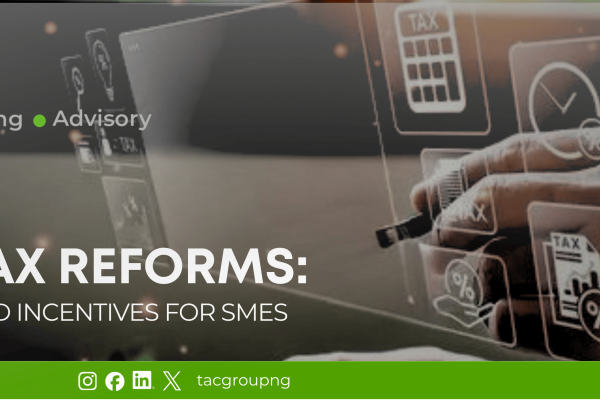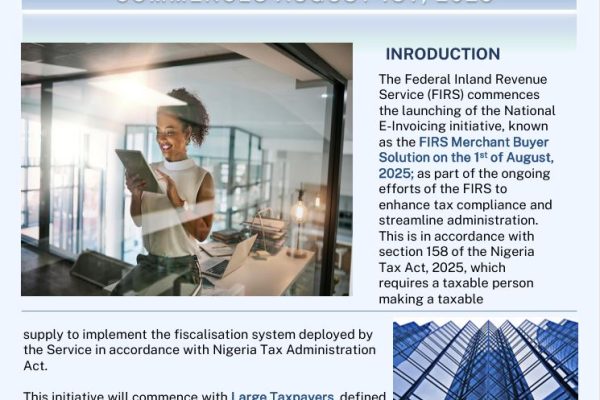FEDERAL HIGH COURT RULES ON THE TAX APPEAL TRIBUNAL (PROCEDURE) RULES 2021; (ORDER III RULE 6) – 50% DEPOSIT
Introduction
The mandatory payment of 50% of tax assessed has been reversed. This is a fundamental change in the Rules. Now a taxpayer who intends to appeal would not need to pay 50% of the disputed tax into an account designated by the Tax Appeal Tribunal (TAT) as security for the appeal.
Voiding Court Order
Justice James Omotosho, in a judgment, held that the provisions were unconstitutional as they constrained the constitutionally provided right of appeal;
The Justice in its judgement voided the court Order III Rule (6) (a) of the Tax Appeal Tribunal (Procedure) Rules (2021) which requires an aggrieved person, challenging the tax charged by the Federal Inland Revenue Service (FIRS) or any relevant tax authority to pay 50 per cent of the disputed amount into any account so designated by the Tax Appeals Tribunal before such appeal could be heard.
Also voided was Order V Rule 3 of the Federal High Court of Nigeria (Federal Inland Revenue Service) Practice Directions (2021) which prescribes that a person intends to challenge an assessment served on him/her shall pay half of the assessed amount into an interest yielding account of the Federal High Court, pending the determination of the application/ proceedings.
The Justice also invalidates Order V Rule 1 of the Federal High Court of Nigeria (Tax Appeals) Rules (2022) which stipulates that where an appellant is appealing against the decision of the Tax Appeal Tribunal, the sum contained in the decision shall be deposited in an interest yielding account maintained by the Chief Registrar of the Federal High Court.
A Senior Advocate of Nigeria and former President, the Nigerian Bar Association (NBA), Joseph Daudu SAN, had filed the suit marked: FHC/ABJ/CS/12/2022 at the Federal High Court to challenge the law which had required him to pay 50 per cent of the N1.2 billion tax he was billed, before he could appeal his assessment.
He argued, among others, that the provisions were unfair, unlawful and a violation of the right to appeal and sued the Minister of Finance, Budget and National Planning, who made the Tax Appeal Tribunal (Procedure) Rules (2021) as 1st respondent.
Court Judgement
Justice James Omotosho of a Federal High Court, Abuja, Wednesday, 8 November 2023, however declared as unconstitutional, null and of no consequences, some sections of the Tax Appeal Tribunal (Procedure) Rules (2021), the Federal High Court of Nigeria (Federal Inland Revenue Service) Practice Directions (2021), and the Federal High Court of Nigeria (Tax Appeals) Rules (2022).
In his judgment, he pointed out that although the 1st respondent (the Minister) had power to make rules for the conduct of appeal and not expected to construct an embargo to the enjoyment of the right to appeal of any appellant.
According to him, “the right to appeal is a constitutional right and the 1st respondent cannot take away such right through the making of a subsidiary legislation.” He stated further that the law is trite and where any law or subsidiary legislation contravenes the provision of the Constitution, it shall be declared void to the extent of its inconsistency.
The provisions being challenged has unnecessarily favored FIRS because any tax debtor who is unable to afford to deposit the entire assessed sum of money is automatically deprived of his right of appeal.
Justice Omotosho subsequently went ahead to declare the provisions of Order III Rule (6) (a) of the Tax Appeal Tribunal (Procedure) Rules, 2021 as “unconstitutional, null and void and contrary to the provisions of section 36(1) and (2), Section 6(6) (a) of the 1999 Constitution of the Federal Republic of Nigeria (as amended) and the doctrine of separation of powers.”
He also declared that the provisions of Order V Rule 3 of the Federal High Court of Nigeria (Federal Inland Revenue Service) Practice Directions, 2021 “is unconstitutional, null and void and of no consequence having regard to the provisions of Sections 251(1), 6(6) (a) & (b), 36(1) & (2) of the 1999 Constitution (as amended), Paragraph 17(1) and 21 of the Fifth Schedule to the Federal Inland Revenue Service (Establishment) Act, 2007 and is contrary to the principles of separation of powers and the Rule of Law.”
The judge also declared the provisions of Order V Rule 1 of the Federal High Court of Nigeria (Tax Appeals) Rules, 2022 as “unconstitutional, null and void and of no consequence having regard to the provisions of Sections 251(1), 6(6) (a) & (b), 36(1) & (2) of the 1999 Constitution (as amended), Paragraph 17(1) and 21 of the Fifth Schedule to the Federal Inland Revenue Service (Establishment) Act, 2007, and is contrary to the principles of separation of powers and the Rule of Law.
He issued an order striking down (deleting) the above provisions or any other similar provisions therein, for being unconstitutional and in excess of the powers of the 1st and 2nd respondents (the Minister of Finance and the Chief Judge of the Federal High Court) to issue practice directions.
Conclusion
This new development is intended to make the TAT more efficient in its dispensation of justice. It is also a reflection of the current realities given the wide adoption of technology in the administration of justice. The provision was challenged on grounds where a taxpayer does not have the cash to deposit as it would have been a bar on access to justice.
The provision may also had been challenged on constitutional grounds of inconsistency with the Federal Inland Revenue Service (Establishment) Act 2007 since it is established that rules cannot override the provisions of an Act. This new dispensation had relieved concerns that the provision was susceptible to abuse by tax authorities who had raised unreasonable assessments in the expectation that a debtor-taxpayer would pay 50% deposit.
TAC Professional Services, November.










